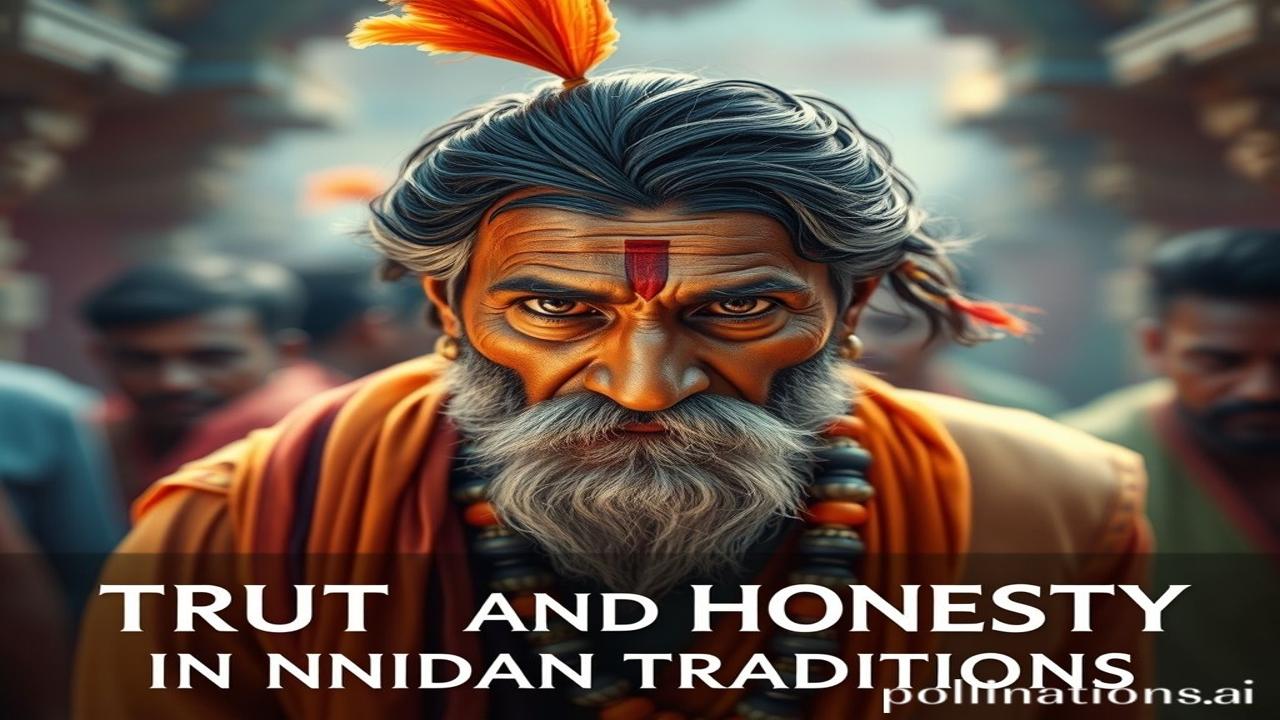Okay, let’s dive into this. Hold your breath, because we’re about to journey back in time!
Sach Ki Khoj: Truth and Honesty in Indian Traditions
Kabhi socha hai, jab koi buzurg aankhon mein dekh kar “sach bol” kehte the, toh unke peeche kitni sadiyon ka itihas hota tha? Waqt ki dhool mein dafan, woh values hain jo humare DNA mein encoded hain. But are we still living up to them? Let’s explore.
Itihas Ki Panno Mein: The Roots of Truth
Truth (satya) and honesty (imaandari) are not just words in India; they are the foundation of dharma, the cosmic order. Think back to the Vedic period (around 1500-500 BCE). The Rigveda talks about ‘Rita,’ the principle of cosmic order, and ‘Satya’ (truth) is intrinsically linked to it. Back then, society was organized around the idea that speaking the truth was not just good; it was essential for the well-being of the entire universe!
But yeh sirf religious texts mein nahi tha. Remember Raja Harishchandra? He gave up his kingdom, family, and faced unimaginable hardship just to uphold his truth. This story, passed down through generations, shows how deeply ingrained the value of truth was in the Indian psyche.
Why is this important? Because it sets the stage for understanding Bharatiyata. Our concept of truth isn’t just about factual accuracy; it’s about ethical conduct, moral integrity, and aligning ourselves with the cosmic order.
Zameeni Sach: Lives Lived With Integrity
Imagine a small village nestled in the foothills of the Himalayas. Here, a farmer, Kishan Lal, wakes up before dawn. He believes that his land is sacred and should be treated with honesty and respect. He doesn’t use shortcuts, avoids cheating, and works hard to cultivate his crops.
Ma Rukmini, his wife, sells the surplus produce at the local market. She ensures that her weighing scales are accurate and doesn’t inflate the prices, even when times are tough. “Beti,” she tells her daughter, “beimaani se kamaya hua paisa kabhi nahi tikta.”
Meanwhile, the village Panditji teaches the children stories from the Mahabharata and Ramayana, emphasizing the importance of truthfulness. He explains that even powerful kings like Yudhishthira faced consequences for their deviations from truth.
These were not extraordinary people; they were ordinary people striving to live extraordinary lives based on the principles of satya and dharma. Their lives reflected the belief that true wealth lies not in material possessions but in moral character.
Dharohar aur Pehchan: Truth in Modern India
Do we see this echoing today? Absolutely, though sometimes it feels like a faint echo. From the Gandhian philosophy of Satyagraha, which used truth as a powerful weapon against injustice, to the ideals enshrined in our Constitution, the concept of truth still holds a prominent place.
However, in the cutthroat world of business, politics, and everyday life, the allure of quick gains often overshadows the long-term benefits of honesty. Corruption, deceit, and manipulation are unfortunately common realities.
Yet, the fire of truth still flickers. We see it in the activists fighting for transparency, the journalists exposing corruption, and the individuals who choose ethical conduct over personal gain. It’s a reminder that the spirit of satya, while challenged, is far from extinguished. This spirit connects us to our cultural heritage and forms a vital part of our modern Indian identity.
Mazedar Tathya ya Bhram-Bhanjak: Busting the Myth
Log samajhte hain ki “sach bolna” hamesha asaan hota hai. Lekin asli sach yeh hai ki satya ko bolne ke liye bahut himmat chahiye. Sometimes, it’s easier to lie and avoid conflict. But true strength lies in facing the consequences of truth, no matter how difficult. This is the real challenge that our ancestors faced and one we continue to grapple with today.
Drishya aur Bhavnayein: The Feel of Truth
Imagine stepping into an ancient temple. The air smells of incense and jasmine. The walls, carved with intricate details of gods and goddesses, feel cool to the touch. The sounds of chanting and bells echo through the halls. In this sacred space, the pursuit of truth feels tangible, almost palpable. You are reminded that truth is not just a concept but a lived experience, woven into the fabric of our culture.
Antim Vichar ya Uddharan: Closing Thought
As the famous shloka from the Mundaka Upanishad says: “Satyameva jayate nanritam” – Truth alone triumphs, not falsehood. Let this timeless wisdom guide us in our lives, reminding us that even in the darkest of times, truth remains our guiding light. Embrace it, nurture it, and let it illuminate the path towards a more just and harmonious world.
